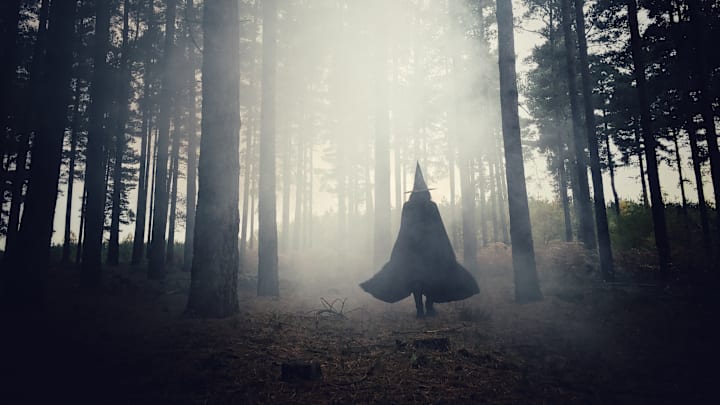Many centuries before candy corn was invented, the ancient Celts celebrated Samhain on October 31, a night that marked the end of the year and the official start of winter. Samhain, which later became folded into Halloween, was also seen as a night when the dead returned to their former homes—or as the 1903 Encyclopedia of Superstitions, Folklore, Occult Sciences of the World puts it, “the night of all the year that spirits walked abroad and fairies were most bold.” Plenty of folklore and superstition once accompanied this evening, and while much of it was concerned with romantic fortune-telling, some lore was significantly spookier. Here are a dozen tidbits from the Encyclopedia of Superstitions to get you in the Halloween mood.
- Be careful at crossroads on Halloween.
- Don’t eat blackberries after Halloween.
- Wave a fiery stick for good luck on Halloween.
- Throw a white stone into a fire on Halloween to see if you’ll live another year.
- To avoid bad luck, stay in your house on Halloween.
- Paint a cross on your boat on Halloween for good luck.
- Head to sea on Halloween to experience the “double sight.”
- Eat an apple on Halloween for good health.
- Watch a bull on Halloween to predict the weather.
- If you want a kid with otherworldly abilities, give birth on Halloween.
- To protect your fields, light a torch and sing on Halloween.
- Beware of witches on Halloween.
Be careful at crossroads on Halloween.

In Wales, a disembodied spirit was thought to be sitting on every crossroad and stile on All Hallow’s Eve. (Stiles are small structures that allow humans, but not animals, to pass over fences.)
Don’t eat blackberries after Halloween.

In the British Isles, it was said to be evil to eat blackberries after Halloween—because on that night the púca (which is Irish for “ghost”) will come and ruin them.
You May Also Like ...
- Find Love With These 18 Old Halloween Fortune-Telling Tricks
- 15 Spooky Halloween Traditions and Their Origins
- 7 Highly Intriguing Victorian Halloween Traditions
Add Mental Floss as a preferred news source!
Wave a fiery stick for good luck on Halloween.

In Scotland, you can secure good luck for yourself by waving around the red-hot end of a fiery stick in certain “mystic figures.”
Throw a white stone into a fire on Halloween to see if you’ll live another year.

Welsh families had an especially creepy bonfire tradition: After building a huge fire, each member of the family would throw in a small white stone they had marked in some way. The next morning, they’d search through the remains of the fire to find the stones. If one was missing, it meant that person wouldn’t live to see another Halloween.
To avoid bad luck, stay in your house on Halloween.

In the Western Isles, it was considered bad luck to leave your house on Halloween.
Paint a cross on your boat on Halloween for good luck.

On All Hallow’s Eve, the fishermen of the Orkney Islands made a cross on their boats with tar for good luck. If they weren’t successful, they sprinkled “forespoken water” over their boats.
Head to sea on Halloween to experience the “double sight.”

Norman seamen who ventured out to sea on Halloween “were said to have the ‘double sight,’ that is, each one beheld a living likeness of himself seated in close contact, and if he was engaged in any work, the phantom was doing the same.”
Eat an apple on Halloween for good health.

Not all superstitions were spooky, apparently—some had to do with mundane health matters. In some Celtic lands, it was thought that if you eat a large apple under an apple tree at midnight on Halloween wearing only a bedsheet, you would never get a cold.
Watch a bull on Halloween to predict the weather.

In the days before Weather.com, some people thought that whatever direction a bull was facing while lying down on Halloween was the direction from which the wind would blow for most of the winter.
If you want a kid with otherworldly abilities, give birth on Halloween.

Children born on Halloween were said to have the “power to see spirits and converse with fairies.”
To protect your fields, light a torch and sing on Halloween.

As late as the 17th century, it was customary for farmers in Scotland and elsewhere to walk around their fields with a lighted torch, singing or chanting a piece of doggerel verse, to protect their fields from harm.
Beware of witches on Halloween.

Halloween was once called “Witches’ Night” or the "Devil’s Sunday,” and was thought to be the occasion for a major celebration led by His Satanic Majesty. Witches were said to leave sticks in their beds to fool their husbands, and then ride to the festivities on broomsticks anointed with the fat of murdered unbaptized infants—or, failing that, a cat. “All Scotch boys will remember how tired the cats were the day after Hallowe’en,” the Encyclopedia of Superstitions and Folklore writes. “Some pitied their miserable appearance; others were mad at them for carrying the witches.”
A version of this story originally ran in 2020; it has been updated for 2025.
